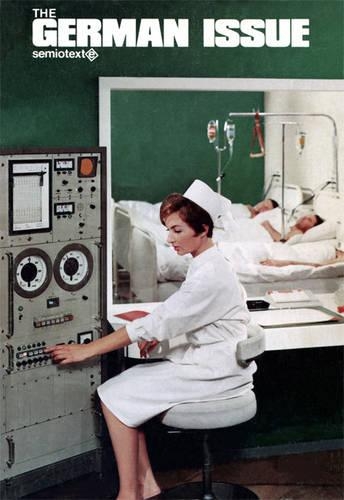
The German Issue
(Hardback, New Edition)
Publishing Details
The German Issue
By (Author) Sylvre Lotringer
Introduction by Sylvre Lotringer
MIT Press Ltd
MIT Press
2nd October 2009
New Edition
United States
Classifications
Professional and Scholarly
Non Fiction
General and world history
943.0878
Physical Properties
Hardback
356
Width 178mm, Height 254mm, Spine 25mm
1179g
Description
A first-hand account of the Western world on the threshold of a major global mutation, bridging art and intellect, culture and politics, Europe and America.The German Issue (1982) was originally conceived as a follow-up to Semiotext(e)'s Autonomia/Italy issue, published two years earlier. Although ideological terrorism was still a major issue in Germany, what ultimately emerged from these pages was an investigation of two outlaw cities, Berlin and New York, which embodied all the tensions and contradictions of the world at the time. The German Issue is the Tale of Two Cities, then, with each city separated from its own country by an invisible wall of suspicion or even hatred. It is also the complex evocation of the rebelling youth-squatters, punks, artists and radicals, theorists and ex-terrorists-who gathered all their energy and creativity in order to outlive a hostile environment. Like a time capsule, The German Issue brings together all the major "issues" that were being debated on both sides of the Atlantic-which eventually found their abrupt resolution in 1989 with the fall of the Berlin Wall. It involved the most important voices of the period-from writers and filmmakers to anthropologists, activists and poets, terrorists and philosophers- Joseph Beuys, Michel Foucault, Christo, Christa Wolf, Walter Abish, Alexander Kluge, Paul Virilio, Ulrilke Meinhof, William Burroughs, Jean Baudrillard, Hans Magnus Enzenberger, Maurice Blanchot, Hans J rgen Syberberg, Heidegger, Andre Gorz, Helke Sander. Opening with Christo's "Wrapping Up of Germany" and the celebrated dialogue between East German dramaturge Heiner M ller and Sylv re Lotringer on the Wall ("Mauer"), since published in many languages, The German Issue offers a first-hand account of the Western world on the threshold of a major global mutation. It also embodies at its best Semiotext(e)'s tenacious effort to establish a creative bridge between art and intellect, culture and politics, Europe and America.
Author Bio
Sylv re Lotringer is Jean Baudrillard Chair at the European Graduate School, Switzerland, and Professor Emeritus of French literature and philosophy at Columbia University. Sylv re Lotringer is Jean Baudrillard Chair at the European Graduate School, Switzerland, and Professor Emeritus of French literature and philosophy at Columbia University. Sylv re Lotringer is Jean Baudrillard Chair at the European Graduate School, Switzerland, and Professor Emeritus of French literature and philosophy at Columbia University. Felix Guattari (1930-1992), post-'68 French psychoanalyst and philosopher, is the author of Anti-Oedipus (with Gilles Deleuze), and a number of books published by Semiotext(e), including The Anti-Oedipus Papers, Chaosophy, and Soft Subversions. Jean Baudrillard (1929-2007) was a philosopher, sociologist, cultural critic, and theorist of postmodernity who challenged all existing theories of contemporary society with humor and precision. An outsider in the French intellectual establishment, he was internationally renowned as a twenty-first century visionary, reporter, and provocateur. Alexander Kluge is an author and filmmaker, known for launching the New German Cinema in the early 1960s. Sylv re Lotringer is Jean Baudrillard Chair at the European Graduate School, Switzerland, and Professor Emeritus of French literature and philosophy at Columbia University. Michel Foucault (1926-84) is widely considered to be one of the most influential academic voices of the twentieth century and has proven influential across disciplines. Paul Virilio was born in 1932 and has published a wide range of books, essays, and interviews grappling with the question of speed and technology, including Speed and Politics, The Aesthetics of Disappearance, and The Accident of Art, all published by Semiotext(e). Alexander Kluge is an author and filmmaker, known for launching the New German Cinema in the early 1960s.
